The power of WhatsApp
The ubiquitous messaging app is proving to be a game-changer in engaging audiences and driving excitement for cultural events.
In the realm of cultural programming marketing, innovation is key. While traditional routes like ticket websites and listings pages often steal the spotlight, there's an unexpected contender making waves: WhatsApp. Yes, that's right – the ubiquitous messaging app is proving to be a game-changer in engaging audiences and driving excitement for cultural events.
As a teenager navigating the vibrant maze of London's nightlife, my quest for the perfect club night was an adventure in itself. Armed with my trusty Time Out listings, I'd bury my face in its pages, scouring for the latest hotspots and underground gems. Hours would fly by as I delved into the web, pouring over club night photos on websites like "We Know What You Did Last Night," each image a glimpse into the city's nocturnal pulse that I was desperate to be apart of it. Not to be forgotten, hunting everyone you thought might be cool on Myspace (classic) Venturing into the depths of East London, I'd eagerly grab my copy of Vice (RIP), ripping out the pages on where the cool kids hung out. I think this early doors obsession with events and nightlife is what led me to the career I have today. I still indulge in the party pages of the Evening Standard magazine wondering if I’ll ever make the cut to feature on them to this day.
Back then, navigating pop culture preferences was more straightforward; if someone sported a style akin to mine, chances were they held a coveted recommendation for the night ahead. And let's not forget the humble flyer – I genuinely collected those, and I spent most of uni handing them out in front of Koko in Camden, it really worked, though thinking back perhaps the insanely cheap drinks deals attached to them, also helped.
It's not just about nostalgia; it's a testament to the visceral journey of self-discovery, where every flyer, every article, and every club night held the promise of finding not just where I wanted to be, but who I wanted to become.
Personally, I've found WhatsApp groups to be more than just avenues for casual chatter—they're catalysts for forging real-life connections and proper deep and loving friendships but also staying abreast of cultural happenings, usually in a space with like minded folk, I’d go as far as to say the majority of events i’ve attended have been via a what’s app group I am active in. After all, we're more inclined to trust recommendations and information shared within our social circles. In essence, WhatsApp groups may serve as hubs for captive advertising, where word-of-mouth spreads like wildfire.
Celebrities like Charli XCX have capitalised on this phenomenon by creating exclusive WhatsApp groups for their dedicated fans. Filled with hints, teasers and occasional marketing mishaps that somehow amplify their charisma (on no other marketing platform can ‘opps’ be a response to hyperlink type blunder) these groups serve as the ultimate insiders' club. Charli XCX's group, offers a sneak peek into her world, with emojis peppering every message and the marketing team's occasional slip-ups adding to the allure.
Similarly, Billie Eilish recently shook up the digital landscape by migrating her followers to a "Close Friends" list on Instagram. By teasing exclusive content related to her upcoming album, Eilish sparked a frenzy, gaining a staggering 7 million new followers in just two days. This strategic move underscores the power of exclusivity and anticipation in driving audience engagement - A testament to the effectiveness of targeted marketing within a digital ecosystem. However, it's crucial to integrate these strategies within a larger campaign framework. The hype generated on WhatsApp or Instagram should seamlessly transition into tangible actions like booking an event.
At its core, the success of WhatsApp marketing lies in understanding your audience and tapping into their behaviour. People crave proximity to what fascinates them, whether it's high-profile talent like Charli XCX and Billie Eilish or smaller grassroots events. By fostering a sense of community and offering exclusive access, cultural programmers can cultivate genuine connections with their audience.
Beyond serving as a vehicle for sales and marketing, WhatsApp communities can also evolve into authentic spaces for help and support, catering to the core needs of their members. In these communities, members not only engage with promotional content but also seek advice, share resources, and offer assistance to one another. Whether it's troubleshooting technical issues, providing recommendations for cultural experiences, or offering emotional support during challenging times, these communities foster a sense of belonging and camaraderie.
By nurturing a culture of reciprocity and mutual aid, cultural programmers can transform their WhatsApp groups into vibrant hubs where members feel valued, understood, and empowered. This deeper level of engagement goes beyond transactional relationships, forging lasting connections that extend far beyond the confines of a marketing campaign.




